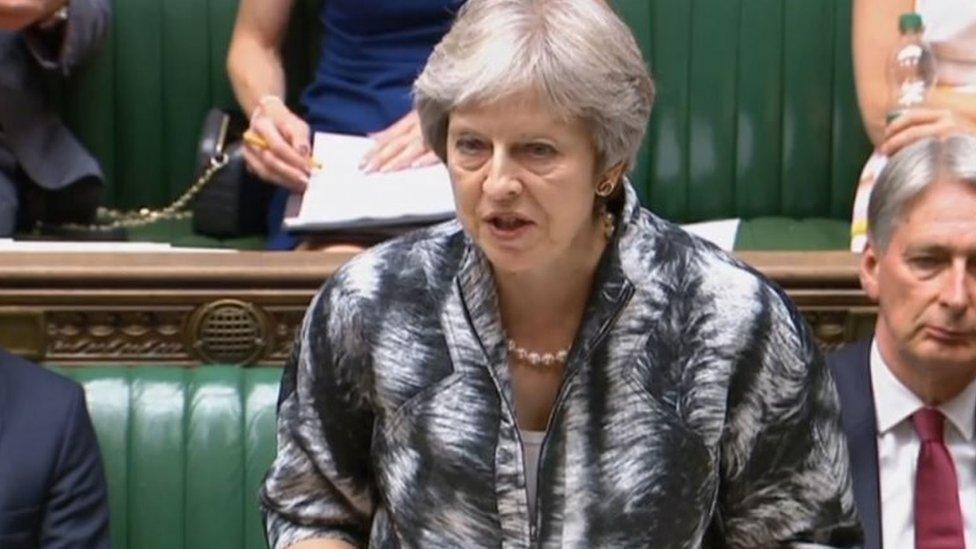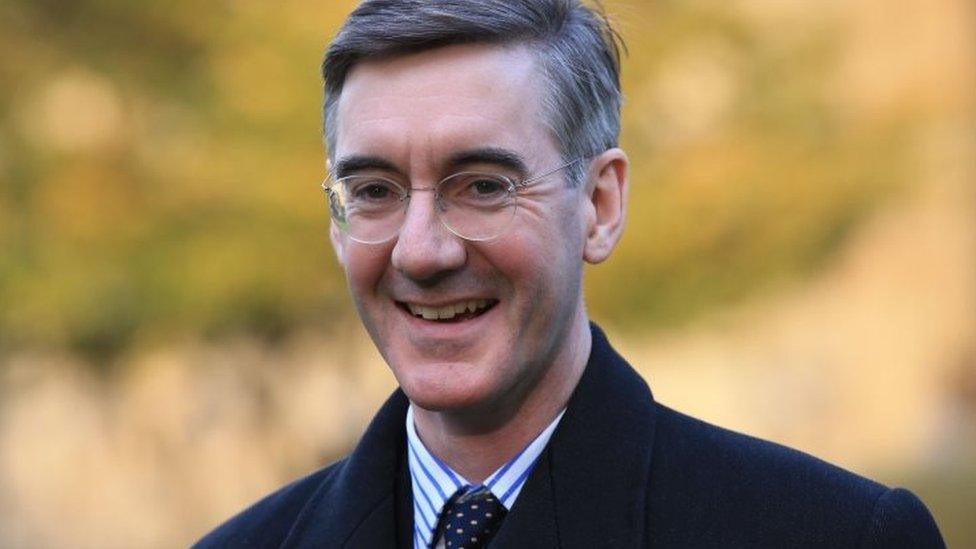Brexit: Theresa May accused of 'cowardice'
- Published
- comments

Prime Minister Theresa May has been accused of "cowardice" and caving into the demands of hard-line Brexiteers.
It followed the government decision on Monday to agree to a legal guarantee that there will be no post-Brexit customs border in the Irish Sea.
The SDLP and Alliance said there is now a real danger of the UK crashing out of the EU with no deal.
However, the Democratic Unionist Party (DUP) said the move would preserve peace.
The proposers of "New Clause 37" - an amendment to the Customs Bill - argued that it would prevent a border between Northern Ireland and the rest of the UK.
On Monday night, MPs approved the clause without going to a vote, but two other amendments tabled by Tory Brexiteers scraped through by just three votes in the Commons.
'The Good Friday Agreement has been thrown around willy nilly'
New Clause 37 directly contradicts the EU's legal draft of the so-called "Irish backstop", which suggested Northern Ireland should be treated as part of the European Union's customs territory.
That legal version of the backstop has already been rejected by Mrs May. However, the prime minister has said she will abide by the principles of a protocol on a future backstop which it negotiated with Brussels in December.
The amendment was backed by both the DUP and the pro-Brexit Conservative European Research Group or ERG.
'Surrender'
East Antrim DUP MP Sammy Wilson said he could not understand the "furore" surrounding the vote and that he was pleased that there was no opposition to the amendment ruling out a border between Northern Ireland and the rest of the UK.
Mr Wilson said he hoped the vote would sent a message to Irish prime minister Leo Varadkar and EU Chief Brexit Negotiator Michel Barnier and that it would negate the backstop which he described as a "surrender to the Irish Republic and the EU".
However, SDLP leader Colum Eastwood accused Mrs May of cowardice, saying that ruling out the backstop will "effectively drive us to a 'no deal' Brexit and probably a hard border in Ireland".
"That is not acceptable to democratic Ireland," he added.

Conservative MP Jacob Rees-Mogg wanted to rule out an Irish Sea border in law
Alliance Brexit spokesman Stephen Farry said Parliament had "undermined the interests of Northern Ireland and the Good Friday Agreement".
"The backstop does not cut off Northern Ireland from the Great Britain market, rather allowing us to more easily be part of both the UK and EU economies," he added.
Sinn Féin President Mary Lou McDonald said that her party had never argued for a border in the Irish Sea and never argued for Brexit.
"Brexit is of the making of the Brexiteers. What we need to ensure is that there is no hardening of the border on our island," she said.
"The simple way out of this is for Britain to remain within the single market, and remain within the customs union. That's the answer."
The amendment was proposed by a number of well known pro-Brexit MPs, including the DUP's Sammy Wilson, Labour's Kate Hoey and the former Northern Ireland Secretary Owen Paterson.
The DUP is due to meet the government later this week to discuss the Brexit plan.

Analysis
John Campbell, BBC News NI Economics and Business Editor
The amendments which the prime minister is accepting to the Customs Bill have implications for her room to manoeuvre on the backstop.
The EU backstop proposal said Northern Ireland should remain in the customs union: the amendment would explicitly prevent that.
The prime minster has already rejected Northern Ireland in the customs union so it may be no big deal on that issue.
But the EU backstop also proposed that EU law on VAT should also continue to apply in Northern Ireland.
One of the amendments would also explicitly prevent this.
This could be a problem, as the UK outside the EU VAT system could mean that VAT processes have to happen at the border.
The UK government's position in regard to ongoing participation in the EU VAT area has never been clear.
At a push, it might still be open for an arrangement where Northern Ireland remains in the single market for goods as that is not dealt with in the amendments.

The UK is due to leave the EU on 29 March 2019 and Parliament is considering a number of new laws needed to prepare for this and for life after the end of a proposed transition period.
- Published16 July 2018
